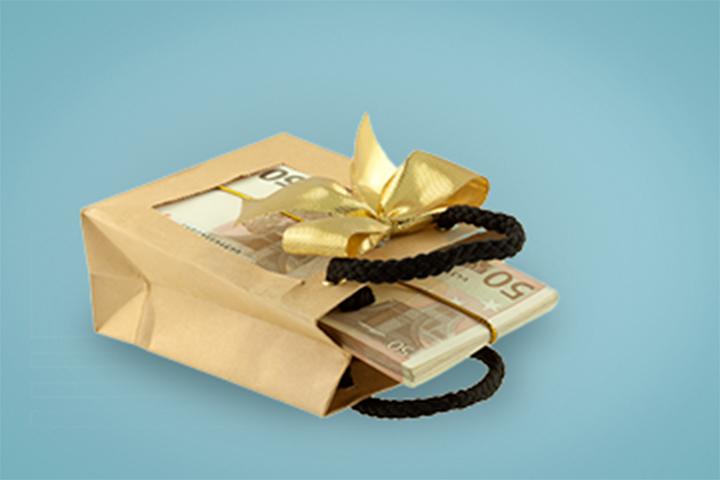What if you are unable to pay the inheritance tax?

Keytrade Bank
keytradebank.be
September 19, 2024
(updated June 26, 2025)
3 minutes to read
Inheriting a family member’s home may bring back memories, but it may also bring you an eye-watering tax sum. The tax may be far more than what you can afford. So what now?
What inheritance tax do you pay on a home?
The amount of inheritance tax you pay depends on various factors:
- The property's value – the calculation is based on progressive rates. This means that in the first band you pay the lowest rate of inheritance tax, in the next band you pay a higher rate, and so on. For example, if you inherited your parents' home in Flanders, you would pay 3% in inheritance tax on the first band of 50,000 euros. In the next band from 50,000 to 250,000 euros, you would pay 9%. And in the band above 250,000 euros, you pay 27%.
- The Belgian region where the deceased lived for the last five years – If the deceased also lived in another region in the last five years, the tax will be levied in the region where the deceased lived the longest in those five years.
- The Flemish Region: in a direct line (children, grandchildren, parents and grandparents) and between partners (married or legally cohabiting), the rates are 3% to 27% depending on the tax band. In Flanders, the tax is calculated separately on movable property (money, shares, jewellery, etc.) and on real estate (property).
- The Brussels-Capital Region and Walloon Region: in a direct line and between partners (married or legally cohabiting), the rates are 3% to 30% depending on the tax band. In these two regions, real estate and movable property are not taxed separately. This means everything is added together to determine the inheritance tax. This may mean you enter a higher tax band sooner. Please note that these rates may change in the future in Wallonia.
- Your (family) ties with the deceased – The closer the family ties, the lower the inheritance tax. The rates are the lowest in a direct line (see above). The rates between brothers, sisters, uncles, aunts etc. along with third parties are higher, and can go up to 55% (in the Flemish Region) and 80% (in the Brussels-Capital Region and Walloon Region).
- If the bare ownership of the property was already yours and the deceased had the usufruct, you generally do not pay any inheritance tax. This is why parents sometimes buy real estate together with their children, as it significantly reduces the inheritance tax bill.
- Inheritance tax exemptions and relief are also arranged on a regional level. As a surviving spouse or legal cohabitant, you don't pay any inheritance tax on the family home in any region (but you do on other property).
When will you receive the notice to pay tax?
If the person died in Belgium, you normally have to declare the estate's value to the tax authorities within four months of the person's death. They will then make the specific calculation and send a notice to pay tax. This usually takes a few weeks to a few months.
When do you have to pay the inheritance tax?
When you receive the notice to pay tax, you have two months to pay the inheritance tax that is due.

What if you don't pay the inheritance tax on time?
If you don't pay on time, the tax authorities will charge you interest. This interest starts on the first day of the month after the due date. In other words, if the due date is 14 November, for example, the interest will be charged from 1 December. In the Flemish Region, the interest is 4%. In the Walloon Region and Brussels-Capital Region, the interest is 7%.
If the deceased had their legal residence in the Flemish Region, you will be charged part of the 4% interest for the months that you are late with the payment. For example, if your payment is three months late, you will be charged 3/12 of 4%. If the inheritance tax is 50,000 euros, you will pay 500 euros in interest. Good to know: even if you disagree with the inheritance tax because you think it has not been calculated correctly, remember that the interest will continue to accrue. It may therefore be better to express your objections but still pay the inheritance tax to avoid the interest.
Can you postpone the declaration and payment?
An initial solution is to buy some time. If you don't yet have the funds to cover the inheritance tax, it is best to wait as long as possible with declaring the estate value. You should generally submit this within four months, but you can leave it until just before the deadline. Be aware that a late declaration of the estate value may result in higher inheritance tax rates.
If, as an heir, you are experiencing serious difficulties, you can also request an extension from the tax authorities to which you need to declare the estate value. In Flanders, you can request an extension of up to two months. That is the standard extension you will receive. If you want more time, you should support your request with a thorough explanation. You can also request an extension in Brussels and Wallonia, provided that it is well justified. Keep in mind that such a postponement will always come at a cost. The tax authorities will increase the inheritance tax based on when you submit the declaration. Another way to buy time is, of course, to pay the inheritance tax as close to the due date as possible. However, do note that the due date always refers to the date the payment needs to be in the tax authorities’ account, so always pay a few business days in advance.
Can you sell the property before paying the inheritance tax?
Yes, you can. If you don't wish to keep the property, you can sell it and then use the proceeds of the sale to pay the inheritance tax. Of course, the entire sale process may take several months, so you will probably still have to find an alternative way to pay the inheritance tax on time. If you want to sell an inherited property, you must have the deed of inheritance for the real estate. You can obtain this deed of inheritance from a registration office or notary. If the deceased had a marriage contract or will, the notary will have to do this for you.
Can you ask for an instalment plan?
In Flanders, you will not receive a deferral of payment, but you may be able to arrange an instalment plan under certain conditions. An instalment plan is not a right. It comes at the tax authorities' discretion. You will therefore need to prove that your financial situation is difficult. The instalment plan will also be subject to late payment interest. The instalment plan will already include the interest due. In Brussels and Wallonia, you can also request a payment deferral. This also requires you to submit a well-supported request. You can receive a deferral of up to 5 years from the date of death. Such a payment deferral may also involve late payment interest.
Is borrowing an option?
Yes, you can also get in touch with a lender to take out a consumer loan. You can also use this loan to pay the inheritance tax pending the sale.
What if you don't pay the inheritance tax?
If you don't pay, the tax authorities will recover the inheritance tax in a different way. For example, they may seize your salary or the assets in your bank account and force the sale of the home.
What if you inherit the home together with your sister and/or brother?
Each heir must pay the tax on the part they inherit, not on what their brother or sister is inheriting. Your brother or sister may inherit more or less than you because this was arranged in a will, for example. Inheritance tax is therefore a personal rather than a joint debt and responsibility. However, the tax authorities are authorised to claim part of the proceeds of a house that is sold to recover any inheritance tax that is still due. So, if you paid all your inheritance tax as required but your brother or sister did not, your brother or sister’s part of the inheritance may be used to cover this and they will end up receiving less when the property is eventually sold.


